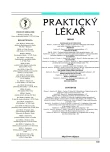-
Medical journals
- Career
Vaccination and consultation in an outpatient clinic of allergy and clinical immunology
Authors: E. Daňková; S. Honzová
Authors‘ workplace: Imunologické centrum, Imumed, s. r. o., Praha
Published in: Prakt. Lék. 2005; 85(8): 461-462
Category: General Medicine
Overview
Allergologists and clinical immunologists are by the law responsible for permanent contraindications of immunizations. They should exclude the possibility of developing a serious allergic reaction or the presence of a serious immunodeficiency before the application of live vaccines. The application of a vaccine after which a serious allergic reaction developed in the past is one of the permanent contraindications, it is also not allowed to use vaccines which contain a compound after which a serious allergic reaction had already developed. Gelatine, egg protein, antibiotics – neomycin, kanamycin, streptomycin, polymyxin B, yeast allergens and tetanus anatoxin alone are considered to be very probably responsible for anaphylactic reactions. A live vaccine must not be given to a person with severe primary or secondary immunodeficiency according to “The Position Papers WHO” for individual vaccines. There is nearly no risk to apply a live vaccine to an adult person with primary immunodeficiency, which is manifested in infancy. Most of the serious primary immunodeficiencies are revealed by the examination of the differential blood count and by the measurement of levels of IgG, IgA, and IgM class immunoglobulins.
Key words:
vaccination – allergic reactions – immunodeficiency – autoimmunity.
Labels
General practitioner for children and adolescents General practitioner for adults
Article was published inGeneral Practitioner

2005 Issue 8-
All articles in this issue
- Microdialysis of adipose tissue and its application in clinical research and practice
- Bacterial immunomodulators
- Diagnosis and therapy of tracheal stenosis
- Follow-up of employees exposed to potentional profession-linked allergens and the inclusion of workers with allergies in the workplace
- Type A aortic dissection, case reports
- Contribution of fine needle aspiration biopsy under control with ultrasound for a more precise determination of the etiology of ascites
- Antibiotics and their application in pregnancy
- Occurrence of drug interactions in clients of the Škoda Employee Insurance Co.
- Vaccination and consultation in an outpatient clinic of allergy and clinical immunology
- General Practitioner
- Journal archive
- Current issue
- Online only
- About the journal
Most read in this issue- Bacterial immunomodulators
- Antibiotics and their application in pregnancy
- Diagnosis and therapy of tracheal stenosis
- Contribution of fine needle aspiration biopsy under control with ultrasound for a more precise determination of the etiology of ascites
Login#ADS_BOTTOM_SCRIPTS#Forgotten passwordEnter the email address that you registered with. We will send you instructions on how to set a new password.
- Career

